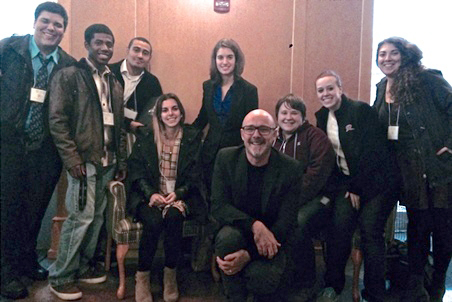Thursday, Dec 11, 2014
Students showcased their papers at the 9th Annual Conference in Medieval and Early Modern Studies at Moravian College
”The Good, the Bad, and the Ignorant," "The Nesting Eggs of Nature," "Cinderella Man," "Feminine Sovereignty"...these were the main titles of papers that seven Rider students presented at the Conference in Medieval and Early Modern Studies at Moravian College in Bethlehem, Pa., on Saturday, Dec. 8, 2014. For them and for their academic peers, the Middle Ages live on as new discoveries about these times continue to be uncovered.
The conference, the only one of its kind in the world, provides an interdisciplinary academic meeting about the Middle Ages and Renaissance for undergraduates. Students from numerous universities and colleges, including Rider, Fordham, Temple, Pennsylvania State and Sarah Lawrence, gathered together to share their scholarship.
Subjects ran the gamut of perspectives from history, literature, art history, theology and popular culture. In its ninth year, the conference is organized by Moravian professors John Black and Sandy Bardsley, features a keynote by a medieval or Renaissance specialist and includes a performance of early music as well as displays of medieval textiles, arms and armor, and calligraphy.
This year, the plenary speaker was Professor Kostis Kourelis from Franklin & Marshall College, whose focus was “Medieval Modern: Byzantium and the Avant-Garde.”
Rider students Josephine Boyle, Lauren Adams, Julia Morales, Nikita Mycyk, Amber Sowinski, Ismail Sulaman and Sarah Brown presented their original research and findings. Their topics ranged from the gender dynamics of twelfth-century poet Marie de France's Lanval and gentilesse in Geoffrey Chaucer's Canterbury Tales to ecocritical readings of Sir Gawain and the Green Knight. They sat alongside their peers, read their papers with quotations in Middle English and fielded questions.
Junior Amber Sowinski found the experience to be very rewarding. "It was interesting to hear other people's thoughts on the materials we read in class,” she says. “I also learned about a lot of other different works from the period."
Their presentations were developed in Dr. Matthew Boyd Goldie's fall course on Medieval Literature in the English Department.
"The student presentations were engaging and intelligent," Goldie says. "Their papers showed how medieval literature offers some of the most complex ways of thinking about matters that concern us today."

